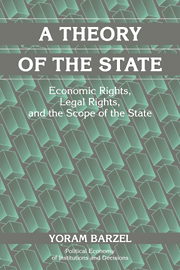Book contents
- Frontmatter
- Contents
- Preface
- 1 Introduction
- I The Emergence of Protection and Third-Party Enforcement
- 2 The State and the Enforcement of Agreements
- 3 Third-Party Enforcement and the State
- 4 The Choice among Enforcement Forms
- 5 Anonymous Exchange, Mixed Enforcement, and Vertical Integration
- 6 Jurisdictional Issues
- 7 Collective Action and Collective Decisions
- 8 Tying the Protector's Hands: The Agreement between Subjects and Protector
- II The Emergence of Legal Institutions
- III The Character of the State
- References
- Index
- Other Books in the Series
6 - Jurisdictional Issues
Published online by Cambridge University Press: 04 December 2009
- Frontmatter
- Contents
- Preface
- 1 Introduction
- I The Emergence of Protection and Third-Party Enforcement
- 2 The State and the Enforcement of Agreements
- 3 Third-Party Enforcement and the State
- 4 The Choice among Enforcement Forms
- 5 Anonymous Exchange, Mixed Enforcement, and Vertical Integration
- 6 Jurisdictional Issues
- 7 Collective Action and Collective Decisions
- 8 Tying the Protector's Hands: The Agreement between Subjects and Protector
- II The Emergence of Legal Institutions
- III The Character of the State
- References
- Index
- Other Books in the Series
Summary
THE VIABILITY OF MULTIPLE THIRD PARTIES
In early society, at the inception of the evolution of interactions, anyone could become a third-party enforcer. No organized power yet existed to stop third parties from emerging. Because enforcement was diverse, numerous third-party enforcers could exist simultaneously, and more than one may have attempted to enforce the same agreements.
Third parties are able to charge a fee for the services they provide because their clients value these services. They set the fee so as to maximize their wealth. A third-party enforcer will not form agreements with individuals who are indifferent to whether or not to belong to his organization. Such individuals' cost of “defecting” is low, and thus the enforcer's power of enforcement over them is very limited. Given their predilection not to comply, an enforcer who allowed them to belong to his organization would only cast doubt on his enforcement ability. Indeed, if enforcement is to be effective, then to the marginal person in the enforcer's clientele the prospect of switching must be seen as resulting in a quantum loss of wealth. The size of that potential loss must be sufficient to prevent the individual from quitting under most of the anticipated cases of enforcement. The amount of the potential loss from quitting is what defines the community from which one might be expelled or excommunicated.
One result of the quantum-loss condition is as follows. Consider the enforcement services offered by two third-party enforcers. Their potential clients attach a value to the service of each of the two enforcers, taking into account the possibility of switching to the other. Correspondingly, each enforcer ranks the individuals according to their valuations of his service.
- Type
- Chapter
- Information
- A Theory of the StateEconomic Rights, Legal Rights, and the Scope of the State, pp. 103 - 112Publisher: Cambridge University PressPrint publication year: 2001



